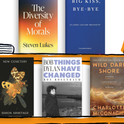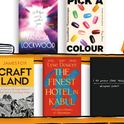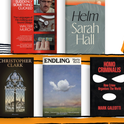The Story of a Heart
by Rachel Clarke (Abacus, £22)
The Story of a Heart is actually the story of Keira. And of Max. The former was a nine-year-old girl who died after a car accident in 2017. The latter is a boy who would also likely have died at the same age and around the same time, were it not for the gift—the ultimate gift—of Keira’s heart.
Normally, when such transplants happen, the donor and donee names are kept anonymous, to avoid certain complications after the operation. But due to the quirk of Max being the face of a Daily Mirror campaign to change the rules around organ donation, both sets of parents were, in this case, able to join the dots between their children—and happily so.
“Happily” because the families of Keira and Max appear to have gained much from their never-wished-for bond. But also because the breakdown of anonymity has enabled Rachel Clarke, a physician who is also an uncommonly good writer, to do some dot-joining of her own. In The Story of a Heart, she speaks not just to both families but to everyone in between—the first-responders, the nurses, the surgeons, administrators and innovators—to reveal how one person’s heart ended up in another’s body.
Of course, there is much sadness here—the scene of Keira’s dad, Joe, waiting outside a hospital to watch a convoy of ambulances take away his daughter’s organs lingers long after the book is finished. But The Story of a Heart is never mawkish. It is instead a clear-eyed act of investigative journalism; Clarke knows her subject and does the legwork too.
It is also, quietly, a work of history. Regular asides describe the advances that have been made in medicine over the past century—in everything from ventilation to stitching to immunosuppression—to make heart transplants possible, including in our own National Health Service. Without these marvels, Keira’s heart would not be living on, beating in the chest of a very fortunate boy.
Peter Hoskin
Wild Thing: A Life of Paul Gauguin
by Sue Prideaux (Faber, £30)
The best biographies shouldn’t succumb to binary tellings of good or evil. With an artist like Paul Gauguin, such is his reputation as either one of the greatest painters of the 19th century or as an exploitative, predatory colonialist, the temptation to fall into one or the other of these camps is especially powerful.
What makes Prideaux’s new biography of Gauguin so good—and one of the best—is that it deftly avoids such pitfalls. Based on newly unearthed material, including a memoir Gauguin himself wrote near his death in 1903, Wild Thing is an engrossing ride through all the major currents of the artist’s life: from his childhood as a “savage” in Peru through to his short career as a stockbroker, his excursions to Brittany, his decisive time with Van Gogh in Arles and, finally, to the period that continues to define him—living and painting among the people of French Polynesia.
Although far from a work of apologism, there are moments in Prideaux’s portrait that, where speculation is necessary, she takes on a more sympathetic stance than is warranted—such as when, having first “surprised himself” by informing one Tahitian family that he was looking for a wife, Gauguin is said to have signed a wedding contract with 13-year-old Tehamana “full of misgiving”, despite his subsequent (by many accounts, including his own) lustful love affair.
But if Prideaux takes occasional liberties, this is only in the service of a higher purpose: to dispel the image of Gauguin as a totem of western art waiting to be toppled, and make him once more a real human in real human history. A man who could be a tremendous spendthrift when moneyed yet careful about repaying debts when he wasn’t; an artist who wished to liberate himself from the vagaries of polite society while agitating for art-world acceptance; a European who tirelessly campaigned for the rights of Polynesians even as he fetishised them as the remnants of a prelapsarian paradise.
In this respect, Prideaux has succeeded—stunningly—in her task. An extraordinary artist, an extraordinary life, a phenomenal book.
David McAllister
Goodbye to Russia: A Personal Reckoning from the Ruins of War
by Sarah Rainsford (Bloomsbury, £22)
It’s fair to say that Sarah Rainsford was there. There for the emergence of Vladimir Putin in post-Soviet Russia. There for Putin’s subversions and then eradication of democracy in his country. There for the invasion of Ukraine and the horrors it wrought.
It is this there-ness that makes Rainsford’s Goodbye to Russia so valuable. As a long-time BBC correspondent, and until her very political expulsion from Russia in 2021, she had access—of a sort—to the court of Putin. But she has also had continued access to opposition figures such as Vladimir Kurza-Murza (who was recently freed from sole confinement in Siberia as part of the prisoner-swap deal that also freed the American journalist Evan Gershkovich), as well as to the people of both Russia and Ukraine.
These people’s testimonies, as well as the author’s own reminiscences, give shape to a book that is, as its title suggests, a form of elegy. What’s being said goodbye to here is less a Russia of the past—in fact, as Rainsford makes clear, there is much in common between Putin’s Russia and the oppressive Soviet Union—and more a Russia that might have been. The hope of the early 1990s, which Rainsford experienced first-hand as a student, has given way to fear.
If there is a problem with Rainsford’s reportage, it’s that it moves on a little too quickly. Each new “part” of the book arrives sooner than you expect it to; every chapter ends more abruptly than you would wish. Goodbye to Russia loses some descriptive detail in the gaps between each new interview, each new location and Rainsford’s own diary snippets.
Still, Rainsford has a lot of ground to cover—30 years-plus of one man’s megalomania—and perhaps this is one of those occasions when the destination matters more than the journey. After all the interviews, extracts, discursions, Goodbye to Russia provides one of the clearest explanations yet for how we ended up with a ground war in Europe in the 21st century. You’ll almost feel as though you were there, too.
Peter Hoskin
Poetry as Enchantment
by Dana Gioia (Paul Dry, £17)
In the preface to his new collection of literary criticism, the Californian poet Dana Gioia says that he admired, when younger, critics who “relied on no special method except their full human intelligence, a knowingness that included emotion, imagination, and memory as well as intellect. Their language… charged by the force in their ideas”. This is an apt description of Poetry as Enchantment.
Gioia is especially interesting in his analysis of Robert Frost’s narrative poetry, which is written with “plain… pure… austere verisimilitude”. These poems are not, as critics have sometimes said, eclogues, rather they are “more rooted in realist fiction and theater than in neo-classical pastoral verse”. Unlike the high extravagance of Browning’s and Tennyson’s dramatic monologues, Frost innovates a dramatic narrative of ordinary people.
Many readers will know Gioia’s splendid memoir Studying with Miss Bishop. Another memoir appears in this collection, a fluid, enticing recollection of Donald Davie, with whom Gioia studied poetry at Stanford. Gioia wanted to write for “the intelligent common reader” and Davie was the tutor he needed. As ever, Gioia has a keen eye for characterful description: “His semi-rimmed eyeglasses were twenty years out of style. He dressed like a minor civil servant who aimed at minimal respectability.”
Beyond all this, we get a full sense of Gioia’s development as a writer, both literally in the memoir and in his careful considerations of a range of poets, several of them under-appreciated, such as Weldon Kees or John Allan Wyeth. I was prompted to order Shirley Geok-lin Lim’s Selected Poems and to rethink several old favourites.
Henry Oliver
Tell Me Everything
by Elizabeth Strout (Viking, £16.99)
Elizabeth Strout’s latest novel tantalisingly promised the literary equivalent of the Marvel Cinematic Universe: the lives of Lucy Barton and Olive Kitteridge finally collide! Both residents in the small town of Crosby, Maine, they’re introduced by their mutual friend Bob Burgess.
Strout has already devoted much time and attention in her earlier novels to the stories of these three characters—and, for long-time fans, meeting them again begins as pure pleasure. Yet, as this rather centreless narrative meanders along, the initial enchantment slowly begins to pale.
Lucy and Olive cement a slowbuilding friendship by telling each other the stories of various people they’ve each known. The notion that these lives would otherwise have passed “unrecorded” seems to lie at the heart of the novel; that each and every one of us lives a life “worthy” of documentation. But this is old ground for Strout, and she doesn’t bring anything substantially new to the conversation here.
Meanwhile, a local man has been accused of murdering his mother—a woman everyone hated—and Bob, an all-but-retired lawyer, agrees to take the case. At the same time, a series of family emergencies demand his excessive emotional energy. And then, to top it all off, he realises that he’s in love with his dear friend Lucy.
As Bob himself says towards the end of the book, “It’s life… it’s just called life,” but it all just feels too busy and unfocused to really come together satisfactorily, the narrative flitting back and forth, without rhyme or reason, between central characters and those on the periphery. The careful, quiet poignancy of Strout’s previous works, not to mention her ability to keenly and cleanly lay bare the loneliness and suffering of her characters on the page, descends here into something both confused and a little too cutesy.
Lucy Scholes












